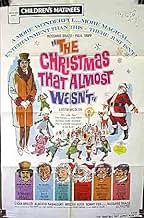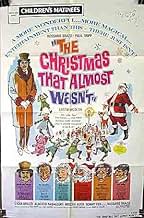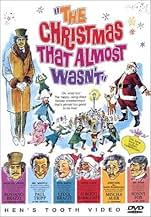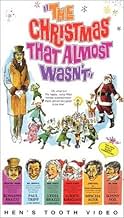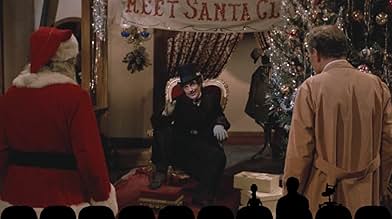IMDb RATING
3.5/10
956
YOUR RATING
Santa has to get a job as Santa to earn money to pay his overdue rent billSanta has to get a job as Santa to earn money to pay his overdue rent billSanta has to get a job as Santa to earn money to pay his overdue rent bill
Lydia Brazzi
- Mrs. Claus
- (as Lidia Brazzi)
Franco Doria
- Elf
- (as Francesco Doria)
Arnaldo Fabrizio
- Elf
- (as Fabrizio Arnaldo)
Domenico Imperato
- Elf
- (as Imperato Domenico)
John Spencer Howell Jr.
- Boy Who Saved Christmas
- (uncredited)
David Tripp
- David
- (uncredited)
Storyline
Did you know
- TriviaThe movie was shot without live sound. While most of the actors mouthed or speak the script in English, in the American version all of the Italian actors, except for Rossano Brazzi, had their voices dubbed by someone else, so that their accents would not show up. Brazzi, who appeared in many American films, is the only Italian who speaks English with his native accent.
- Quotes
Sam Whipple: Wait a minute! If you are Santa, what are you doing here? You're early!
Santa Claus: Christmas is not coming this year.
- ConnectionsFeatured in A Hollywood Christmas (1996)
Featured review
This obscure Italian musical fantasy was actually made in the then-prevalent style: elaborately-mounted, garishly-colored and broadly comic in tone (bringing to mind both THE GREAT RACE {1965}, with Rossano Brazzi's Phineas T. Prune looking quite a bit like Jack Lemmon's Professor Fate from that film and CHITTY CHITTY BANG BANG {1968}, which also involved a child-hating villain) – in fact, it comes complete with an animated title sequence! Incidentally, the anti-Christmas feeling inherent within the film would turn up again the same year in Chuck Jones' animated rendition of Dr. Seuss' HOW THE GRINCH STOLE Christmas (by the way, I will be checking out the 2000 live-action version as part of my ongoing Christmas binge)! Writer/director/star Brazzi – who, curiously enough, died on Christmas Eve 1994 – had already proved his vocal mettle (in heavily-accented English) with the popular musical SOUTH PACIFIC (1958). For the record, this was his first of only 3 directorial efforts – the others being no less intriguing, and admirably versatile, namely the caper CRIMINAL AFFAIR (1968) and the giallo PSYCHOUT FOR MURDER (1969; which I have opted to acquire in its original cut, since a 'harder' version was commissioned for the overseas market that reportedly saw the involvement of cult figure Renato Polselli!).
Anyway, while the film under review emerges as no unsung gem, it was a harmless and surprisingly engaging addition to the Yuletide movie lore, its plot also recalling the seasonal perennials MIRACLE ON 34TH STREET (1947; in view of the fact that the real Santa Claus seeks employment in a department store to fill just that role!) and the much-filmed "A Christmas Carol" (given Prune's eventual softening). The songs (music by future Jess Franco{!} regular Bruno Nicolai and lyrics by one Paul Tripp, who also co-stars as the lawyer – Brazzi's own neighbor! – helping Santa thwart the villain's plans to disrupt the eagerly-awaited festivities) are hardly classics, but the title tune in particular is quite pleasant. Being an international production (here presented dubbed in English albeit still sporting the original Italian credits), Father Christmas is played by an unknown Italian actor (Alberto Rabagliati) – who, amusingly, gets the shivers in having to deal with children, since he usually encounters them while they are asleep (similarly, he and Tripp get carried away trying out the toys in the store, which merely elicits a head-shaking reaction from prospective customers)! His spouse, then, is played by Brazzi's own second wife (Lydia) and the wiry elderly clerk at Santa's workshop is the ever-reliable character actor Mischa Auer in one of his last films. Typically, a number of midgets are behind the bearded fat man in the red suit or, more precisely, the toys he distributes door-to-door all around the world every Christmas Eve.
With respect to Prune's beef with the Christmas period, it transpires that he has purchased the entire North Pole so that, knowing Santa will not be able to pay the lease, he can evict the latter (which Brazzi takes great pleasure in, turning up every day like clockwork expressly to upset the old man's meal!) and, therefore, no toys will be manufactured and delivered from then on! In fact, Santa takes up the extra employment in order to meet his new landlord's demands (which the latter nips in the bud by purchasing the establishment too and firing St. Nick and his attorney on the spot!). Incidentally, one quibble I have with films purporting to present the Real McCoy: if Santa is supposed to be the be-all-and-end-all of Christmas gifts (in that he has to bring them personally to kids, with his herd of reindeer and all), where do the plentiful toys in sundry department stores across the globe come from?! As expected, Brazzi's scheme (aided in his nefarious exploits by cadaverous butler John Karlsen) is ultimately foiled, with children everywhere willingly giving their pocket money to save Santa from his predicament. Prune, on the other hand, is revealed to have believed in Father Christmas himself once upon a time but his letter asking for a sail-boat had gotten misplaced, and this was the reason he grew up detesting all things connected to the proverbial 'jolly' season!
Anyway, while the film under review emerges as no unsung gem, it was a harmless and surprisingly engaging addition to the Yuletide movie lore, its plot also recalling the seasonal perennials MIRACLE ON 34TH STREET (1947; in view of the fact that the real Santa Claus seeks employment in a department store to fill just that role!) and the much-filmed "A Christmas Carol" (given Prune's eventual softening). The songs (music by future Jess Franco{!} regular Bruno Nicolai and lyrics by one Paul Tripp, who also co-stars as the lawyer – Brazzi's own neighbor! – helping Santa thwart the villain's plans to disrupt the eagerly-awaited festivities) are hardly classics, but the title tune in particular is quite pleasant. Being an international production (here presented dubbed in English albeit still sporting the original Italian credits), Father Christmas is played by an unknown Italian actor (Alberto Rabagliati) – who, amusingly, gets the shivers in having to deal with children, since he usually encounters them while they are asleep (similarly, he and Tripp get carried away trying out the toys in the store, which merely elicits a head-shaking reaction from prospective customers)! His spouse, then, is played by Brazzi's own second wife (Lydia) and the wiry elderly clerk at Santa's workshop is the ever-reliable character actor Mischa Auer in one of his last films. Typically, a number of midgets are behind the bearded fat man in the red suit or, more precisely, the toys he distributes door-to-door all around the world every Christmas Eve.
With respect to Prune's beef with the Christmas period, it transpires that he has purchased the entire North Pole so that, knowing Santa will not be able to pay the lease, he can evict the latter (which Brazzi takes great pleasure in, turning up every day like clockwork expressly to upset the old man's meal!) and, therefore, no toys will be manufactured and delivered from then on! In fact, Santa takes up the extra employment in order to meet his new landlord's demands (which the latter nips in the bud by purchasing the establishment too and firing St. Nick and his attorney on the spot!). Incidentally, one quibble I have with films purporting to present the Real McCoy: if Santa is supposed to be the be-all-and-end-all of Christmas gifts (in that he has to bring them personally to kids, with his herd of reindeer and all), where do the plentiful toys in sundry department stores across the globe come from?! As expected, Brazzi's scheme (aided in his nefarious exploits by cadaverous butler John Karlsen) is ultimately foiled, with children everywhere willingly giving their pocket money to save Santa from his predicament. Prune, on the other hand, is revealed to have believed in Father Christmas himself once upon a time but his letter asking for a sail-boat had gotten misplaced, and this was the reason he grew up detesting all things connected to the proverbial 'jolly' season!
- Bunuel1976
- Dec 28, 2011
- Permalink
Details
- Runtime1 hour 29 minutes
- Sound mix
Contribute to this page
Suggest an edit or add missing content

Top Gap
By what name was The Christmas That Almost Wasn't (1966) officially released in Canada in English?
Answer
